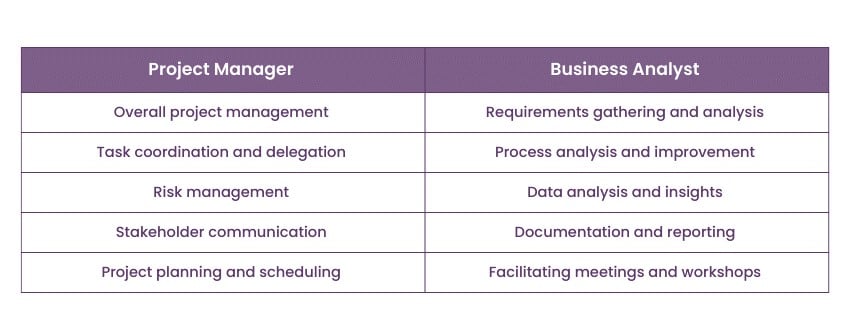We may not have the course you’re looking for. If you enquire or give us a call on +971 8000311193 and speak to our training experts, we may still be able to help with your training requirements.
Training Outcomes Within Your Budget!
We ensure quality, budget-alignment, and timely delivery by our expert instructors.

Effective project execution relies on the collaboration and expertise of various roles, including Project Managers and Business Analysts. Understanding these roles' distinct responsibilities and skills is crucial for successful project outcomes. In this blog, we will compare the roles of Project Manager vs Business Analyst, shedding light on their key attributes and contributions.
By providing a detailed comparison, we aim to understand the roles of Project Managers and Business Analysts comprehensively. We will explore their responsibilities, skills, and focus areas, highlighting their unique contributions to project success. This blog explains the contrasts between the careers of Project Manager vs Business Analyst & identifies which role is superior.
Table of Contents
1) Overview of Project Manager
2) Overview of Business Analyst
3) The difference between a Business Analyst and a Project Manager
4) Collaboration and interactions
5) Conclusion
Overview of Project Manager
A Project Manager is a vital figure in the successful execution of business projects. They generally guide all aspects of a project from initiation to completion. Let's dive into their core responsibilities, skills, and qualifications.
Responsibilities
Project Managers' key responsibilities include project planning, task coordination, risk management, and stakeholder communication. They are accountable for setting project goals, creating detailed plans, and promptly executing tasks. Effective communication with stakeholders, team members, and clients is essential for maintaining alignment and addressing any issues that arise during the project lifecycle.
Skills and qualifications
Project Managers possess a diverse skill set that enables them to navigate complex projects successfully. Leadership skills are crucial as they guide and motivate the project team, driving them towards the common goal. Organising and multitasking skills help them manage project timelines, allocate resources, and track progress efficiently. Additionally, strong problem-solving abilities enable them to identify and mitigate risks, ensuring smooth project delivery.
Project Management Certifications such as Project Management Professional (PMP) or PRINCE2, demonstrating their expertise in project management methodologies. These certifications validate their knowledge of best practices, enabling them to adapt and apply suitable methodologies to meet project requirements.

Overview of Business Analyst
A Business Analyst is vital in understanding and translating business needs into executable requirements. Let's explore their primary responsibilities, skills, and qualifications.
Responsibilities
Business Analysts are responsible for analysing business processes, identifying improvement opportunities, and gathering project requirements. They collaborate with stakeholders to understand their needs and document requirements effectively. Business Analysts also conduct data analysis to derive insights and support decision-making. Furthermore, they ensure that projects align with the organisation's strategic objectives.
Skills and qualifications
Business Analysts possess a unique skill set that enables them to excel in their role. Analytical skills are essential as they help identify patterns, understand complex systems, and propose innovative solutions. Problem-solving abilities allow them to address business challenges and recommend effective strategies. Additionally, strong communication skills enable Business Analysts to interact with stakeholders, elicit requirements, and facilitate effective collaboration between business and technical teams.
Business Analysts often have a solid understanding of business processes and domain knowledge specific to their industry. Business Analysts may hold certifications such as Certified Business Analysis Professional (CBAP) or Certification of Competency in Business Analysis (CCBA), which validate their expertise and demonstrate their commitment to professional growth in the field.
Try our Introduction to Project Management Certification Course today!
The difference between a Business Analyst and a Project Manager
To understand the distinctions between Project Managers and Business Analysts, let's compare their responsibilities, skill sets, and focus areas.
Areas of focus
Project Managers primarily focus on overall Project Management, ensuring project goals are met, tasks are completed on time, and stakeholders are engaged and informed. They oversee project planning, risk management, and stakeholder communication.
Business Analysts primarily focus on understanding and documenting business requirements. They analyse processes, identify areas for improvement, and work closely with stakeholders to gather and validate requirements. Business Analysts also conduct data analysis to uncover insights and support decision-making.

Collaboration
Project Managers and Business Analysts collaborate closely in various areas, fostering successful project outcomes. They collaborate during requirements gathering, where Business Analysts provide valuable insights to shape project scope. Stakeholder management is another collaborative area, as both roles engage with stakeholders to ensure alignment and meet their expectations.
Unique contributions
Project Managers provide strategic direction, manage resources, and ensure project delivery within constraints. They focus on the project as a whole and oversee its successful completion. Business Analysts contribute by analysing business needs, identifying opportunities for improvement, and translating requirements into actionable deliverables. Business Analysts are vital in ensuring that projects address business objectives and deliver value.

Try our Project Management Office Fundamentals Certification Course!
Collaboration and interactions
The collaborative relationship between Project Managers and Business Analysts is crucial for project success. Visual representations can help showcase their interactions, such as meetings, workshops, and communication channels. Let's explore the importance of effective collaboration, mutual understanding, and shared goals.
Effective communication
Business Analyst and Project Manager communicate to establish a shared understanding of project objectives and requirements. They conduct meetings, such as kick-off meetings, where they discuss project scope, deliverables, and timelines. Regular status updates and progress meetings align both roles and provide opportunities to address any challenges or risks.
Mutual understanding
Collaboration requires a mutual understanding of roles, responsibilities, and perspectives. Project Managers need to understand the business requirements and constraints articulated by Business Analysts, while Business Analysts need to consider the project management constraints and priorities communicated by Project Managers. This mutual understanding ensures that project objectives and business needs are harmonised.
Shared goals
Business Analyst and Project Manager, both roles aim to deliver projects that meet the business objectives successfully. They align their efforts towards this shared goal by maintaining open lines of communication, fostering transparency, and actively seeking input from each other. Collaboration helps them identify areas of overlap, resolve conflicts, and optimise project outcomes.
Examples of collaboration
Explore practical instances where Business Analyst and Project Manager join forces to align project scope, resolve conflicts, and optimise outcomes, showcasing the power of effective collaboration in project success.
a) Scope alignment: Business Analyst and Project Manager collaborate to align project scope with business requirements. They work together to ensure that project deliverables address the identified needs and prioritise the most critical requirements.
b) Conflict resolution: In case of conflicts or disagreements, Project Managers and Business Analysts collaborate to find mutually beneficial solutions. Their collective expertise helps them identify compromises that balance project constraints and business priorities.
c) Optimising outcomes: Business Analysts provide valuable insights and data analysis to help Project Managers make informed decisions. Managers rely on the expertise of Business Analysts to optimise project outcomes and maximise business value.
Get certified with our Certified Digital Services Project Manager (CDSPM) Course!
Conclusion
As we conclude this blog, we hope it helped you understand the differences between Project Manager vs Business Analyst. This blog highlights their distinct responsibilities and skills. While each role brings unique contributions, their complementary nature is key to project success. By leveraging the strengths of both roles, organisations can maximise project outcomes and achieve greater success.
Become a Project Manager with our Project Management Courses | Training & Certifications!
Frequently Asked Questions
Upcoming Business Analysis Resources Batches & Dates
Date
 Introduction to Project Management Course
Introduction to Project Management Course
Fri 10th Jan 2025
Fri 14th Mar 2025
Fri 9th May 2025
Fri 15th Aug 2025
Fri 10th Oct 2025
Fri 12th Dec 2025







 Top Rated Course
Top Rated Course


 If you wish to make any changes to your course, please
If you wish to make any changes to your course, please


